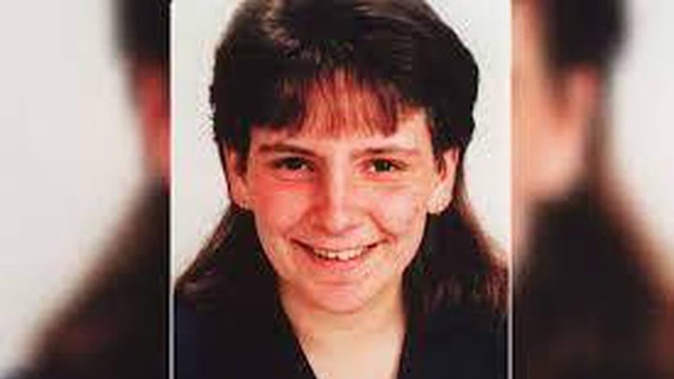
The man who admitted killing Angela Blackmoore has told a jury about killing the Christchurch mother, alleging a debt collector arranged for him and another woman to murder her for $10,000.
Former debt collector David Hawken, 50, and Rebecca Wright-Meldrum, 51, are on trial in the High Court at Christchurch. They deny murdering Angela Blackmoore on August 17, 1995.
A third person, Jeremy Powell, earlier admitted murdering Blackmoore and alleged he carried out the killing on Hawken’s instruction after being offered $10,000. Hawken’s motive, Powell claimed, was to free up a property deal.
He said Wright-Meldrum, who was his girlfriend at the time, accompanied him to Blackmoore’s home and that she used her friendship with her to gain entry into the house.
On Wednesday, Powell, who is serving a life sentence with a minimum non-parole of 10 years, gave evidence in the High Court at Christchurch with a prison guard beside him.
/cloudfront-ap-southeast-2.images.arcpublishing.com/nzme/C4CREH6OHRBYJILBXDL4SVC7K4.jpg)
Angela Blackmoore was stabbed to death in her Christchurch home in 1995.
The 49-year-old said he met Wright-Meldrum a year before Blackmoore’s murder at his flatmate’s party. He was about 19 or 20 at the time, and she was a “few years older” than him.
He described their relationship as “wonderful. It was brilliant”.
Blackmoore had come and visited the couple at their home a few times. Wright-Meldrum and Blackmoore were friends from school or childhood, he believed.
- 'If you don’t, I’ll kill you': Jury hears of threatening call two days before murder
- Killer told friend he was 'high as a kite on MDMA' during confession
- Angela Blackmoore cold case: Man allegedly offered pair $10k for 'murder'
Crown prosecutor Pip Currie asked Powell about his life before he met Wright-Meldrum.
“Just a pretty normal country lad…” he said. He grew up in Oxford in a “pretty nice, normal environment…. Went to church on Sunday, went to school, had friends.”
Once he started dating Wright-Meldrum his life changed, with parties, drinking and recreational drug use.
He met Blackmoore about half a dozen times.
He met Hawken through Wright-Meldrum. He understood he was associated with several gangs, including the Devil’s Henchmen.
The two men got on well, he said. He added Hawken was “scary” and “intimidating”.
/cloudfront-ap-southeast-2.images.arcpublishing.com/nzme/UFIGMW2VJFGGLJ46HCKDWDVKCI.jpg)
David Peter Hawken (left) and Rebecca Elizabeth Jane Wright-Meldrum (right) are charged with murdering Angela Blackmoore on August 17, 1995.
He claimed Hawken told him he was responsible for six murders in the North Island.
Powell said Hawken got him and Wright-Meldrum to visit him and suggested they kill Blackmoore for $10,000.
Asked why them, Powell said he thought it was because he’d done a few debt collection jobs for him, that he knew the money would be valuable and that Hawken trusted Wright-Meldrum.
He said the money was “more than I’d ever imagined back then. It seemed like a huge amount”.
At first, he thought Hawken was joking.
“I couldn’t believe it was actually a real thing.”
/cloudfront-ap-southeast-2.images.arcpublishing.com/nzme/LUHSSUMD6ZC3FG6PNUMPXSDQ34.jpg)
David Peter Hawken was working as a debt collector associated with the Templars Motorcycle Club. Photo / George Heard
He said there were several meetings at Hawken’s Cashel St home where the trio would discuss the murder while smoking cigarettes and drinking some beers.
He said Hawken suggested the method of the murder by hitting Blackmoore with a bat and then slitting her throat.
Wright-Meldrum would get them inside as she knew Blackmoore, who was “quite paranoid with strangers”.
Asked what his girlfriend’s attitude about the murder was, he alleged she was “the driver behind it”.
He said he did not want to do the murder, but wanted to impress Wright-Meldrum and said the money seemed like a lot.
“I was hoping to put it off … talk the big talk and hope it would all go away.”
There had been an initial plan to kill Blackmoore one evening, but when they parked across the road he “chickened out”.
Afterwards, he spoke to Hawken, who he alleged threatened him and his family.
Powell said Wright-Meldrum told him they had to go through with it.
A few days later they went back to Blackmoore’s house, parked across the road and walked to the front door.
Powell was wearing a long trenchcoat, with a knife and a baseball bat hidden under.
They went into the living room, Powell stood around and claimed Wright-Meldrum kept giving him the signal to do it.
“I wasn’t doing it fast enough.”
They then went into the kitchen for a coffee, which he said was a “lure” and Wright-Meldrum said “now,” he said.
Blackmoore was distracted, turned away, and he struck her with a bat.
“I remember hitting her two of three times with a bat, I remember the bat breaking.”
Asked by Currie why he hit her with a bat, he said it was to knock her out “so that she wouldn’t feel anything”.
“I didn’t want to hurt her”.
Asked if everything went to plan, he said he did not think so.
He said he did not have a detailed recollection of the murder.
He said there was blood everywhere, and he believed he’d killed her with the knife but can not remember doing it. He accepts he did murder her with the knife. Earlier in the trial, the jury heard Blackmoore suffered 39 stab wounds to her head, neck, chest, abdomen and limbs.
After the killing, he said Wright-Meldrum cleaned the scene by wiping everything down with a tea towel.
“When we left she was pretty angry with me for touching something … I can’t remember what.”
He said he felt “panicked” afterwards, and that Wright-Meldrum seemed “calm”.
Powell said he did not know that there was a child asleep in the house, or that Blackmoore was nine weeks pregnant.
“I was horrified,” he said when he found out.
After the murder, they returned to their flat on Linwood Ave where they put the knife, bat and clothes in an open fire.
“We had to get rid of any evidence,” he said.
He then drank half a bottle of gin.
He took the remains of the knife and buried it at a beach.
After the murder, he spoke with police. He said Wright-Meldrum told him to tell the truth, except about that night, and to say they spent the night together.
The pair went to see Hawken a few days to a week after the murder.
“He told us to stay away for a while, a few months, lay low.”
He said Hawken told them he would sort the money out “at a later date”.
He alleged Hawken also told them not to talk to anyone.
“He said snitches are a dying breed, literally.”
He would chase Hawken up for the money, but he would put him off and “make excuses”.
He never received the money.
Powell and Wright-Meldrum broke up about six months after the murder. They would have the odd “brief hookup”.
He said Wright-Meldrum had a scrapbook with articles about the murder. When he heard about the murder he felt “shame, guilt”.
Earlier, in her opening remarks, Hawken’s lawyer Anne Stevens KC told the jury that Hawken did not have any involvement in Blackmoore’s murder.
“The defence case is that David Hawken had no motive to kill Angela Blackmoore and he had nothing to gain from killing her and he had no power to order the killing.”
Powell murdered Blackmoore for his own satisfaction, Stevens argued saying he “enjoys violence” and was depraved.
“Powell masterminded and then executed Angela Blackmoore’s murder in the most violent and extreme manner possible.”
Wright-Meldrum’s lawyer, Stephanie Grieve KC, asked the jury to keep an open mind until they had heard all the evidence.
“Focus on whether the Crown has proven beyond reasonable doubt that Mr Powell is telling the truth and that she was there with him. Is his innocence credible and reliable or is he lying about her involvement?”
The trial continues.
Sam Sherwood is a Christchurch-based reporter who covers crime. He is a senior journalist who joined the Herald in 2022, and has worked as a journalist for 10 years.
Take your Radio, Podcasts and Music with you









